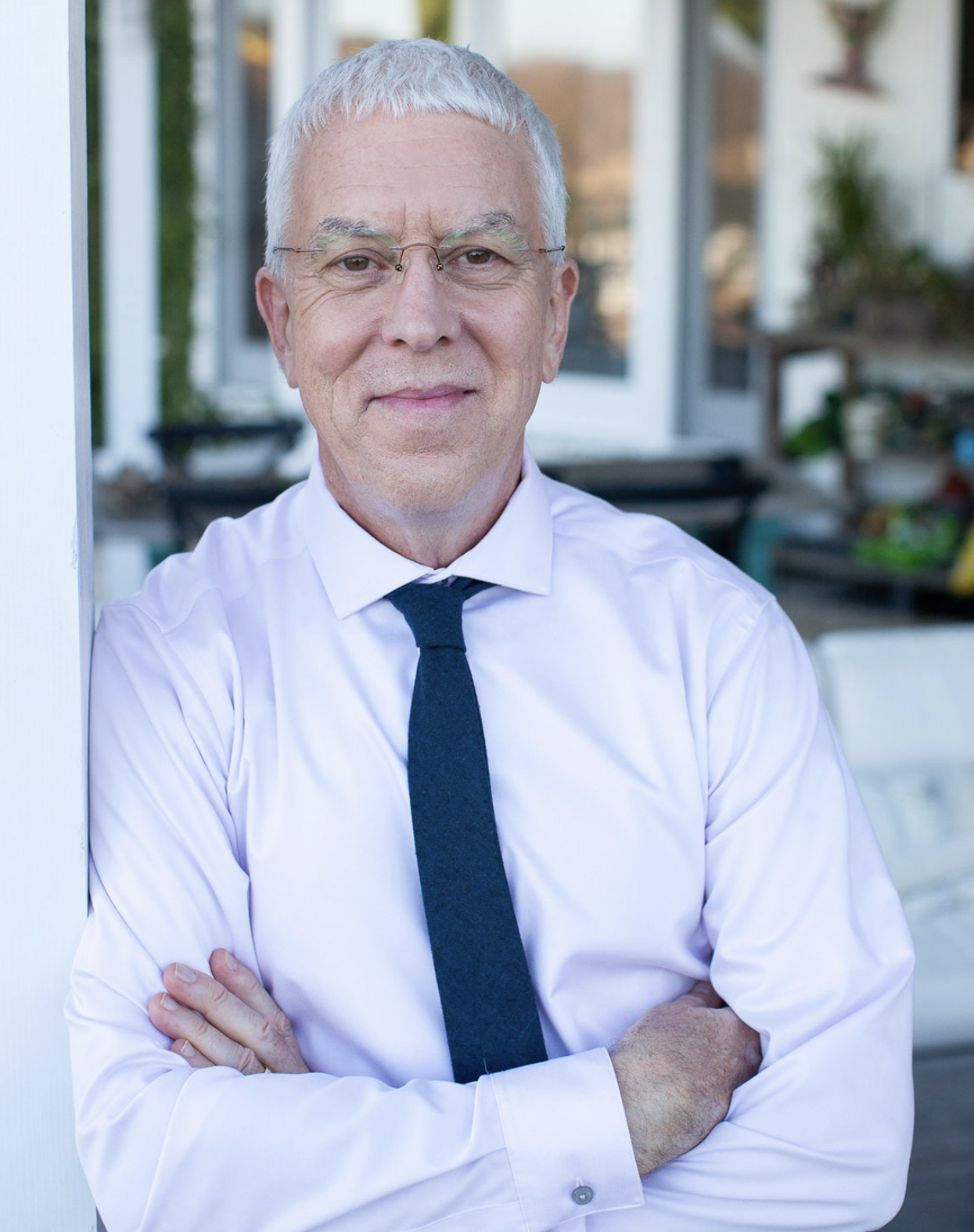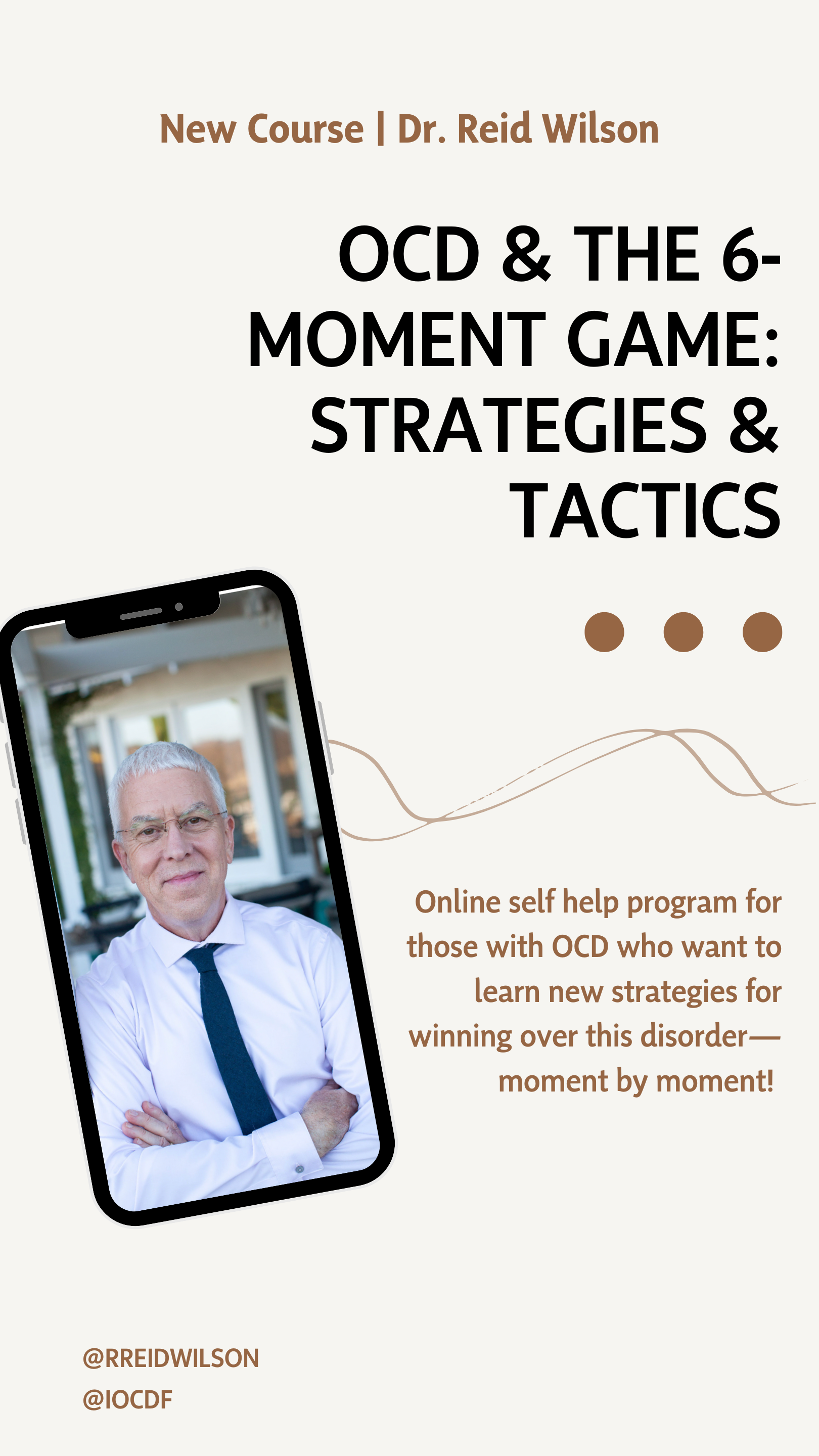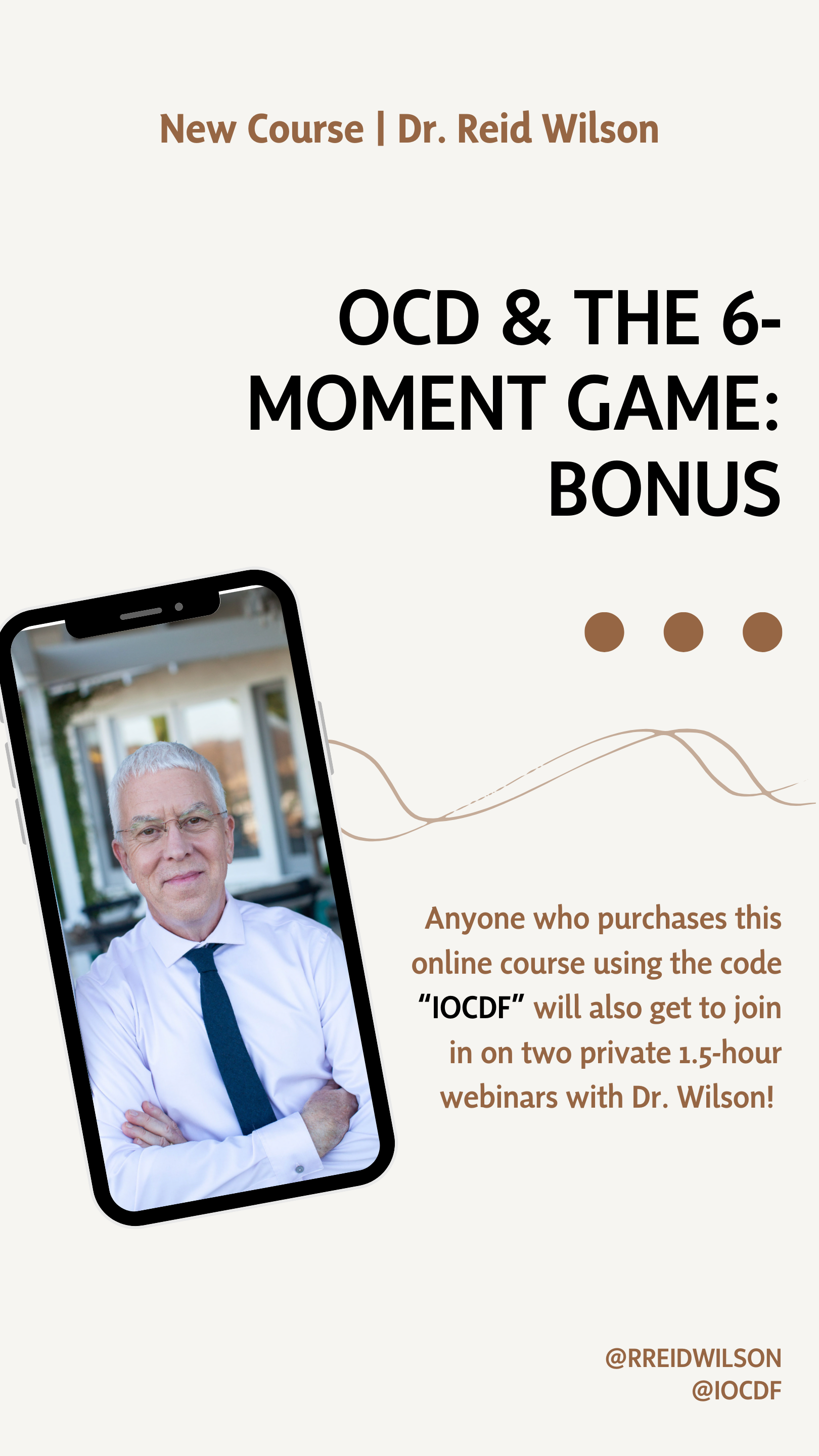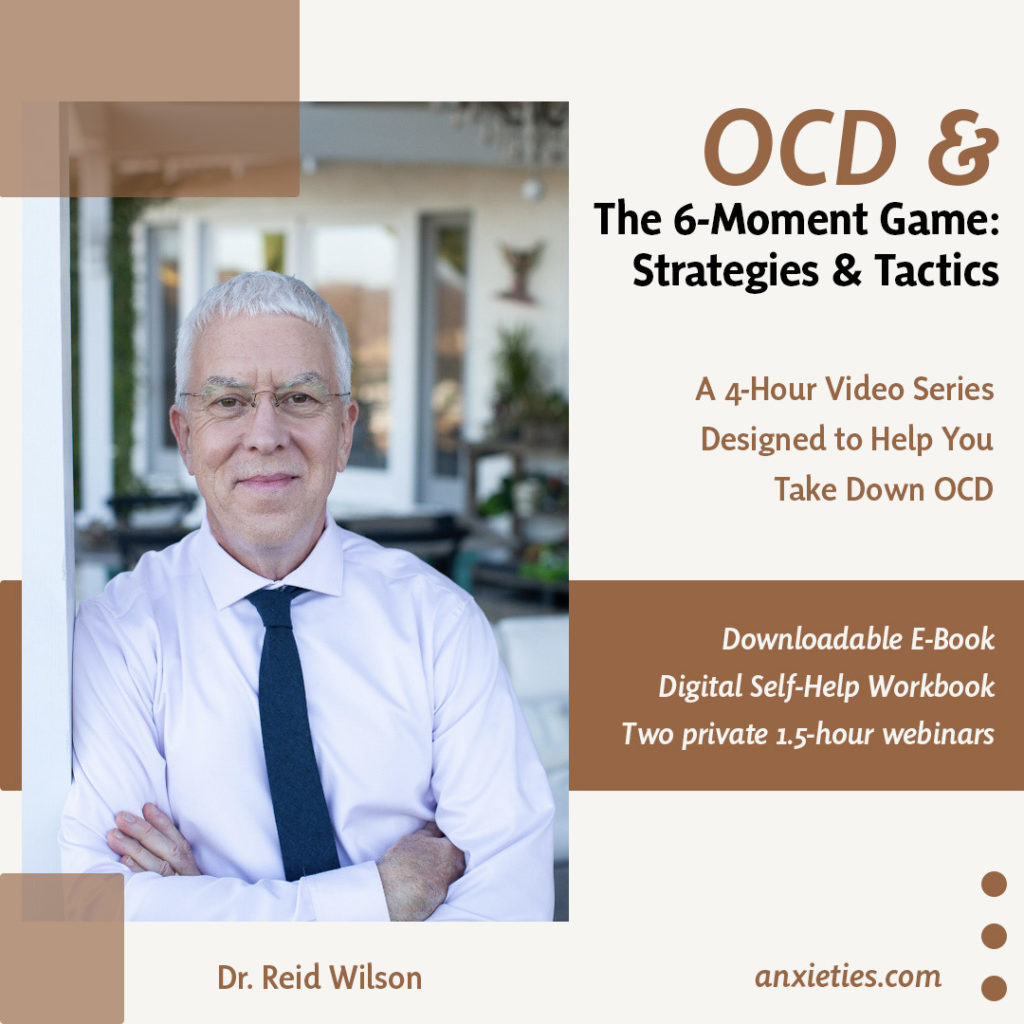Written by Reid Wilson, PhD
Imagine for a moment that you’re starting to get stronger. No, let’s say you’re doing great handling your OCD. What might that look like?
How about this? An obsession pops up. You catch it: “Oh, there’s that again.” You shrug your shoulders. “That’s fine. Nothing I gotta do about it.” Then you turn your attention away from that thought, even that urge, and bring it back to wherever you were just before that momentary interruption.
If you can do that pretty consistently, you are doing great. Taking your life back from OCD
doesn’t mean the absence of obsessions. It doesn’t mean that the urges to do a compulsion disappear. It means that you’re frequently applying a moment-by-moment strategy that quickly handles brief intrusions.
But why wait around for the endgame? Why not train yourself, to the best of your ability, to
push toward that strategy from the beginning of treatment. That’s the 6-Moment Game. Take a look…
Moment 1:Sometimes (but not always) your unconscious will get triggered by threat, and the only thing you consciously notice is that you’re feeling a sense of apprehension without even noticing the source.
Moment 2: An obsession pops up
Moment 3: You spontaneously react to the obsession with distress and perhaps an urge to ritualize.
There is nothing you need to do about those 3 moments. They happen pretty darn quickly. So your work needs to start here:
Moment 4: You mentally step back and notice that thought, that feeling, even that urge, for
what it really is: your worthless, irrelevant obsession.
Moment 5: You commit to treating all of that for what it is: as nothing that’s relevant, as
nothing that deserves your attention. You treat it as none of your business.
Moment 6: You now turn your attention to anything else, and commit yourself to making
whatever that may be as more important than the obsession and the urge to ritualize.
That’s it. That’s the game. If you can get to Moment 4 — “There it is” — you just won that
moment, even if a few seconds later the obsession or urge pops back up. If you can get as far as Moment 5 — “I’m treating that as nothing” — then you won that moment, even if it grabs your attention again in the blink of an eye. When you can get all the way to Moment 6 — “Now where was I?” — you won that moment.
And if your obsession or urge to ritualize instantly shows up again? Brand. New. Game. Brand new opportunity to win over OCD again.
Don’t get frustrated. “Don’t get frustrated?!? You try living with my OCD!” Yes, I know, I know. However, one of your most powerful treatment assets is your attitude. If OCD can keep you upset, it controls your attention, and that’s its game plan. What’s yours? I think it should be a neurological one. Train your amygdala to quiet down. That takes lots of moment-by-moment practice. Your limbic system is arousing you because it’s been trained to protect you from the (false) threat that OCD has imposed on you. Repeatedly, in those moments, you need to convey the message of, “I’m fine; no threat here.” This attitude shift includes a stance of “I want this”
any time OCD shows up. Why? Because every time you think, “Ack! Not again!” you are
signaling your amygdala to protect you from threat.
Make a shift. You already know that frequent practice of your exposure skills is required if you want to get stronger. Embrace that. When the disorder pops up, welcome it as another
opportunity to practice. Honestly, purposely, welcome the opportunity! Adding that is essential to your practice, because that’s the attitude shift that counters OCD’s move to generate fear and loathing within you. At the same time, by adding that “I want this” spirit, you are continually sending an essential message to your neurology: “I’m good with this. I don’t require you to guard me right now.”
This is aggressive work. The disorder isn’t going to relinquish control. You have to take it back! Imagine that whenever it shows up (that’s Moments 1, 2 and 3), you respond with the attitude of, “Great! There you are. Thanks for giving me a chance to kick you to the curb.” Start wanting what you’ve been telling yourself that you don’t want. “What!” you say, “Why would I ever do that?”
Here's why…
This work is incredibly paradoxical. Whenever OCD rears its ugly head, your impulse will be to feel upset and want to get rid of it. When you resist the present moment like that, you’re no longer in the present moment. But if you will want whatever is already present in your mind and body, then all your attention is available to get to work on shifting the present moment. So, grab hold of your “I want this” attitude. Now go after Moments 4, 5 and 6. Take satisfaction in winning any of those moments. Don’t worry about the past or the future. Win the present moment. Start collecting those wins.
Yes, it’s true: Every time you win, you then have to sit with distress and uncertainty. But that’s all it is. It’s not doubt about the theme that OCD has handed you, like some horrible mistake you made or are about to make. It’s just the emotion of plain old generic, painful, distressing uncertainty. And every moment you can tolerate it, you will get just a little bit stronger. That’s what you want, right?






I had breast cancer 5 years ago in remission. Psyc said I have ocd. Will your program help me. I don’t do much or have interests. Have tried volunteer work, walking with friends but anything I do, I get physical symptoms. My symptoms are stomach funniness or back and then I have fear the cancer came back. Maybe it’s fear of death! Willl this program help? I was told catch the thought, name the thought, reframe the thought then go back to what you were doing. I’m not doing anything and can’t figure out what to do. I spend most of my time trying to find the answer to stopping this disease. If that course would help I want to do it. Please help. On meds, exercise, pray, Bible study, fear of people and places. Thanks
I saw the Part 1 of the Metacognitive Approach to OCD and am very interested to see and/or be a part of Part !! I do not know when it is going to be live-streamed, but it says September. This approach is very meaningful and works in conjunction with other methods. I was wondering how to be a part of it or at least be able to view it if it has already happened. Thanks, Sandra Tillinghast
Hi Sandra,
We haven’t held Part II yet, but if you’d like to rewatch Part I it can be found here:https://www.youtube.com/watch?v=5lxcZ3L2zQg.